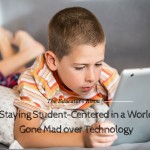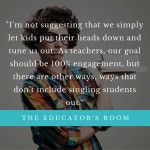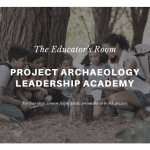Over spring break, I read an amazing book called Readicide by Kelly Gallagher. We’ve talked about the book on the site before in this excellent article, so I won’t go too in depth here. We do not have reading goals in my classroom, mostly for the reasons that Gallagher outlines. I want my students to read because they like to read, because they’re excited about the book they’ve chosen and not because they feel like they have to. I liked the way Gallagher talked about the benefits of reading and how important it is for students to develop a love for it.
So, in my classroom, we have reading groups. Students start out the year with a book tasting. They are placed into groups based on book interest. As the year goes by, I give them a bit more freedom to choose the books they want to read. It’s working out.
The Books and Movies
Throughout this process, I learned something interesting that I want to share. There are some books that students are judging based on their movies. Sometimes, this helps the book become more popular, and other times, it makes students less likely to pick the book. So today, I wanted to list five books that I’ve noticed this phenomenon occurring with and share some of the ways we could encourage students to read them.
- Holes by Louis Sachar. Students who love the book also enjoy the movie. Sure, some kids might cheat and just watch the movie. There are enough subtle differences that a teacher will be able to tell when a student is trying to cheat
- The Hobbit by JRR Tolkien. This situation just annoys me. The Hobbit is one of my favorite books of all time. Some students don’t want to read it because they’re looking for a more laid-back story than the movies. Others read the story looking for all the action and adventure of the movies. They are a little disappointed to find out that the book is so different. I try to be honest about the book and how different it is from the movies. Then the future reader knows exactly what they’re getting into and can make an informed judgment. Most of my students have actually enjoyed it.
- The Jungle Book by Rudyard Kipling. Some students will try to just watch the movies. Once they start talking about the musical numbers though, you know you have identified students who have seen the movie. Expecting it to be familiar, students pick it up the book, but they also don’t realize that a short book does not necessarily mean one that is easy to read. So far, though, students who have given The Jungle Book a fair try have loved it. That’s the big selling point, “Try it; you might like it.” Just don’t assume you’re very familiar with the story.
- Ella Enchanted by Gail Carson Levine. This isn’t one of my reading group books, but it is one that I have had multiple discussions. Some students don’t want to read it, thinking the movie was a little over the top and cheesy. First, they’re not wrong (which is why I love it). Second, the book is different from the movie. If I tell them that the Ella Enchanted movie is actually more of a Cinderella story, they usually are much more interested in reading it.
- Coraline by Neil Gaiman. This is one that, like Holes, benefits from having a movie made based on the story. Sure, there are differences, but it’s not drastic. Students seem to enjoy finding the subtle differences and comparing the two, in a way that they can’t for other movies based on books. Really, this is a fun one and I love having it available in my classroom. Students who like Coraline also often are interested in books by Stephen King or Kendare Blake. This makes it what I call a hook book, and I love that.
These are five books that have been made into movies that, for better or worse, my students have seen and tend to enjoy. Some of these movies mean that students are already interested in reading at least one book, even if they don’t normally like to read. Some of these movies mean that students are reluctant to try the book and that a bit more convincing is needed.
Final Thoughts
I guess the big takeaway here is this. Students need to read. There are a lot of movies based on books and some of those movies are accurate. Some are not. Students may have a prejudice against a book because of the movie or the movie may give them unrealistic expectations about those books. Sometimes, the movie might make the book even more popular.
When I started my reading groups, I hadn’t expected that. I’ve always been able to separate the book and the movie, and I’d forgotten that some people can’t do that. For my students, especially the ones who hate to read, this makes it both easier and harder to find a good book to read. I guess all I can do is hope those books with great movie adaptations are also hook books, and that I keep encouraging my kids to read, at least a little bit. I guess book to movie adaptions are both a help and a hindrance to encouraging students to read.






